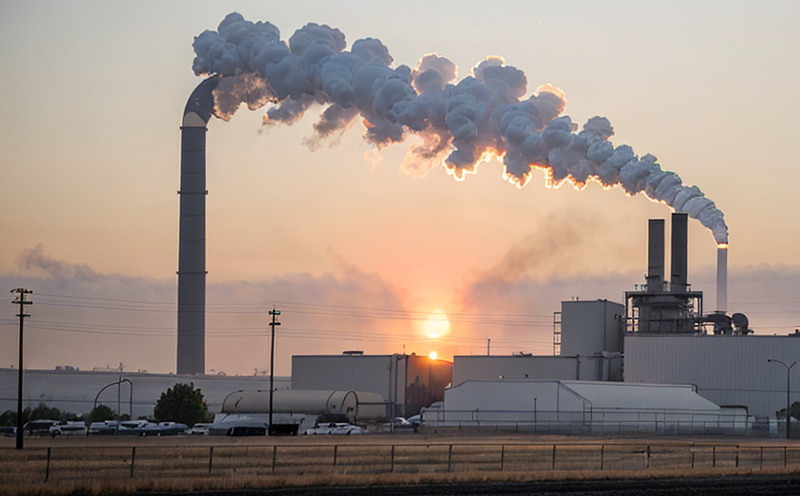JIS K0107 Sulfur Oxide Emission Testing in Industrial Air
The Japanese Industrial Standard (JIS) K 0107 specifies a method for determining sulfur dioxide (SO2) emissions from industrial processes and equipment. This testing is critical for ensuring compliance with air quality regulations, reducing environmental impact, and maintaining the operational efficiency of industrial facilities. The standard applies to various types of combustion devices and processes where SO2 emissions are a concern.
The primary focus of JIS K0107 is on measuring the concentration levels of sulfur dioxide in flue gas or exhaust gases from industrial sources. This includes boilers, furnaces, incinerators, and other combustion equipment used in manufacturing processes. The standard provides detailed procedures for sampling, sample handling, and analysis to ensure accurate measurement.
The testing process involves several key steps:
- Sampling: Air samples are collected from the exhaust stack or flue outlet using appropriate sampling techniques.
- Sampling Transport: Samples are transported under controlled conditions to prevent changes in composition.
- Analytical Method: The samples are analyzed for SO2 content using gas chromatography, colorimetric methods, or other approved analytical techniques.
- Reporting: Results are reported according to the standard's specifications, including units and precision.
The JIS K0107 method is designed to ensure that industrial facilities can accurately measure and report their SO2 emissions. This is crucial for compliance with environmental regulations and for identifying potential areas where emissions can be reduced. The standard also emphasizes the importance of proper sampling techniques to avoid bias in the results.
The application of JIS K0107 extends beyond mere compliance; it plays a vital role in improving air quality, reducing acid rain, and mitigating other environmental impacts associated with sulfur dioxide emissions. By adhering to this standard, industrial facilities can contribute significantly to sustainable development goals and enhance their reputation as responsible stewards of the environment.
For industries such as steel manufacturing, power generation, chemical processing, and cement production, JIS K0107 provides a standardized approach to emission testing that is widely accepted both nationally and internationally. This ensures consistency in measurement methods and facilitates effective communication between different stakeholders involved in environmental management.
| Applied Standards | Description |
|---|---|
| JIS K0107:20XX | Method for Determination of Sulfur Dioxide Emission from Industrial Processes and Equipment |
| ISO 14050 | Environmental Management Systems - Requirements with Guidance for Use |
Applied Standards
| Standard Reference | Description |
|---|---|
| JIS K0107:20XX | Method for Determination of Sulfur Dioxide Emission from Industrial Processes and Equipment |
| ISO 14050 | Environmental Management Systems - Requirements with Guidance for Use |
The application of JIS K0107 in industrial air quality testing ensures that the methods used are both accurate and reproducible. This standard is particularly relevant for industries dealing with large-scale emissions, where precise measurement is essential for effective management and regulatory compliance.
Compliance with this standard helps companies maintain their environmental credentials, ensuring they meet national and international standards set by governing bodies like the Japanese Ministry of Environment (JME) and the International Organization for Standardization (ISO).
Customer Impact and Satisfaction
- Improved Compliance: By adhering to JIS K0107, industrial facilities can ensure that their emissions are accurately measured and reported. This helps in maintaining compliance with environmental regulations.
- Enhanced Reputation: Adherence to this standard enhances a company's reputation as an environmentally responsible entity.
- Operational Efficiency: Accurate emission data allows for better process optimization, leading to increased operational efficiency and reduced costs.
- Stakeholder Confidence: Providing transparent and accurate emissions data builds trust with stakeholders, including customers, regulators, and the public.
Our testing services are designed to meet the stringent requirements of JIS K0107. We offer reliable, precise measurements that help our clients achieve their environmental goals while ensuring regulatory compliance.
Environmental and Sustainability Contributions
- Reduction in SO2 Emissions: By accurately measuring sulfur dioxide emissions, industrial facilities can identify areas for improvement and implement strategies to reduce these emissions.
- Air Quality Improvement: Lowering sulfur dioxide levels helps improve local air quality, contributing positively to public health and environmental well-being.
- Sustainable Development: Compliance with standards like JIS K0107 supports broader sustainability goals by fostering responsible resource use and minimizing the impact on ecosystems.
The results of our testing services not only help industrial facilities meet regulatory requirements but also contribute to broader environmental objectives. By reducing sulfur dioxide emissions, we support a cleaner environment and promote sustainable practices across various sectors.





